ECNL soccer all-stars represent the pinnacle of youth soccer development in the United States, where elite athletes compete in the nation’s premier developmental league while earning recognition through National Selection Games, championship tournaments, and showcase events that attract hundreds of college scouts. From the Continental Tire ECNL National Selection Games featuring East versus West all-star matchups to regional championship celebrations honoring league-leading clubs, ECNL creates pathways for exceptional youth soccer players to demonstrate excellence on national stages.
Yet many clubs, schools, and organizations struggle to appropriately celebrate their ECNL all-star athletes beyond fleeting social media posts or temporary locker room displays. Selection to ECNL National Selection Games represents months of dedicated training and performance excellence, but recognition often disappears within weeks. Club championship achievements lack permanent documentation. Individual honors and college commitments go unrecognized in facilities where athletes train daily. Meanwhile, younger players searching for role models and inspiration find limited evidence of the elite achievements earned by athletes who came before them.
This comprehensive guide explores evidence-based strategies for recognizing ECNL soccer all-stars through permanent displays, interactive digital platforms, and systematic recognition programs that honor individual excellence, inspire future athletes, and strengthen organizational pride around elite youth soccer achievement.
Effective ECNL all-star recognition extends beyond temporary bulletin boards—it creates systematic approaches that celebrate national selection achievements, document club championship success, honor individual accomplishments, inspire younger athletes through visible role models, and build organizational identity around elite soccer development. Organizations that excel at ECNL recognition integrate these celebrations into facilities, digital platforms, and ongoing institutional culture rather than treating them as isolated announcements.

Modern recognition systems showcase ECNL all-star achievements while inspiring the next generation of elite youth soccer athletes
Understanding ECNL All-Star Recognition Opportunities
Before implementing comprehensive recognition programs, organizations must understand the various ECNL all-star designations and achievement levels that merit celebration.
ECNL National Selection Games
The Continental Tire ECNL National Selection Games represent the most prestigious all-star recognition within the league, bringing top players together for showcase competition.
Selection Process and Criteria
ECNL National Selection Games occur at major regional events throughout the season, featuring handpicked top performers selected by ECNL Player Identification staff through months of scouting and recommendations based on competitive performances. Players selected for National Selection Games do not compete for their clubs on that day, instead receiving dedicated rest and preparation time for the all-star showcase. The selection represents significant honor, as hundreds of athletes compete for limited roster spots.
These games feature East versus West format competitions, creating regional pride while showcasing the nation’s best youth soccer talent. College coaches and national team scouts attend in force, with some National Selection Games drawing more than 300 collegiate scouts among attendance exceeding 1,500 spectators.
Recognition Significance
Selection to ECNL National Selection Games indicates:
All-Star Achievement Markers
- Recognition as one of the top players in the age group nationwide
- Months of consistent elite performance earning scout attention
- Demonstration of technical skill, tactical awareness, and competitive excellence
- College recruitment visibility at premium showcase events
- Potential pathway to national team identification programs
- Peer recognition among the nation’s best youth soccer players
Organizations should prominently feature National Selection Game participants in recognition displays, as this achievement represents objective validation of elite status within the most competitive youth soccer environment in the United States.
Learn about comprehensive athletic recognition approaches in digital storytelling for athletic programs with systematic documentation strategies.
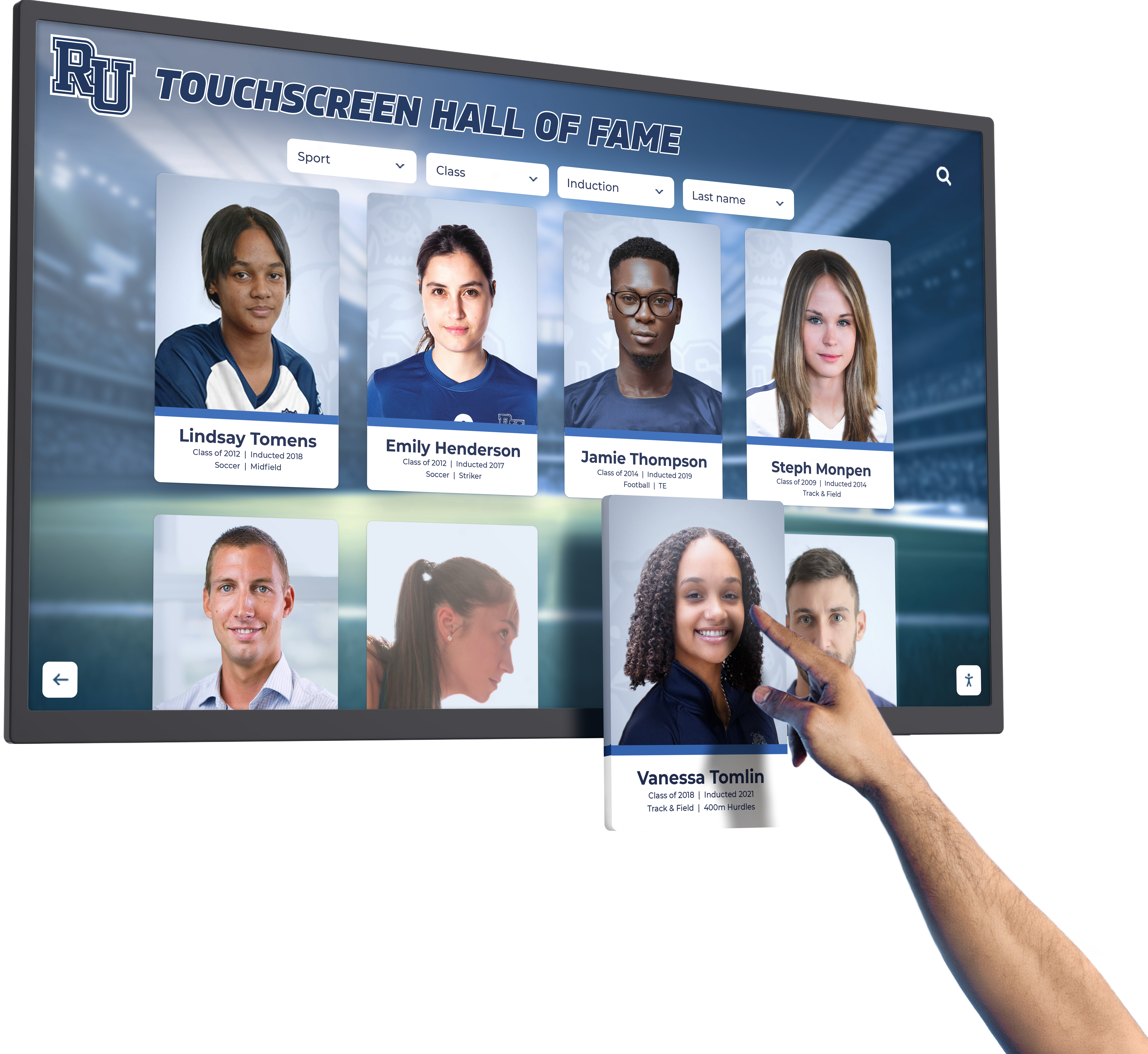
Interactive displays enable exploring detailed athlete profiles showcasing ECNL achievements and career progression
National Championship Recognition
ECNL National Championships represent the ultimate team achievement, with clubs competing in age-group-specific national finals determining champions.
Championship Structure
The ECNL conducts national championships across multiple age groups (U13-U19), with playoff qualifiers advancing to national finals events held at premier venues. Recent national champions have included established elite clubs like San Diego Surf (U13 and U14 champions), Michigan Hawks (U15 champions), MVLA (U16 champions), and Real Colorado National (U17 champions).
Championship recognition should celebrate team rosters comprehensively, coaching staff and technical leadership, season records and tournament progression, defining games and memorable moments, and individual honors earned during championship runs.
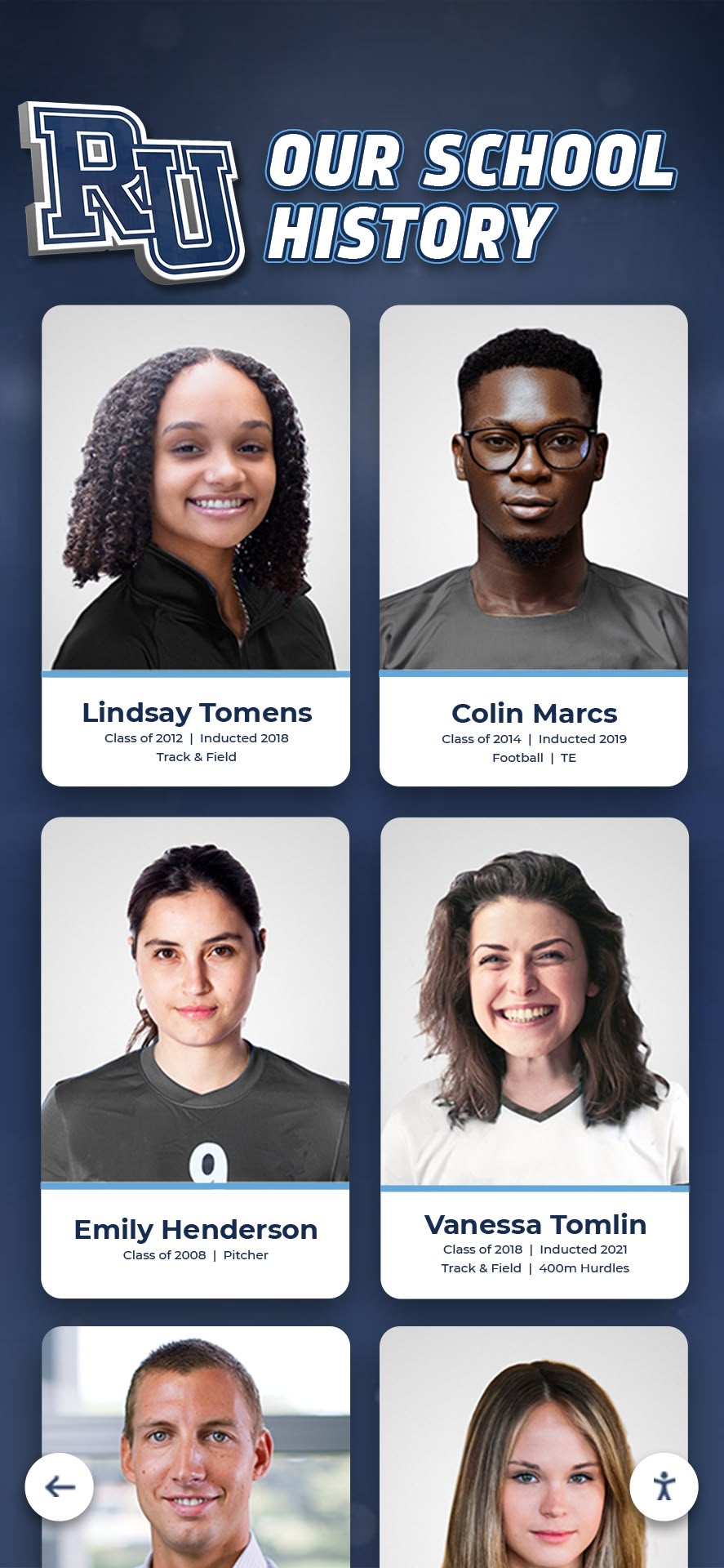
Comprehensive team displays document complete championship rosters ensuring every athlete receives recognition
Regional Conference Championships
Beyond national championships, ECNL recognizes conference champions and playoff participants at regional levels. These achievements merit celebration as they represent sustained excellence throughout regular seasons and conference tournament success.
Organizations should systematically document conference championships, playoff appearances and advancement, conference all-star selections, and regional tournament victories creating complete records of competitive achievement at all levels.
Individual Player Recognition Categories
ECNL creates multiple pathways for individual recognition beyond National Selection Games and championships.
Player of the Year Awards
ECNL recognizes age-group-specific Players of the Year, acknowledging the single most outstanding performer in each competitive division. Recent recipients like Allison Park from MVLA, named 2024-2025 ECNL Girls U16 Player of the Year, demonstrate the caliber of athletes earning this distinction.
Player of the Year recognition indicates sustained excellence throughout entire seasons, statistical dominance in competitive environments, leadership impact on team success, and recognition by coaches, scouts, and league administrators as the division’s best.
All-Conference and All-Region Selections
ECNL recognizes top performers through all-conference and all-region team selections, honoring athletes demonstrating excellence within their competitive divisions. These selections provide recognition opportunities for outstanding players whose clubs may not win championships but who demonstrate individual excellence.
College Commitment Celebrations
While not ECNL-specific recognition, the league’s reputation as the nation’s premier youth soccer developmental platform means ECNL athletes frequently earn Division I, II, and III college commitments. Organizations should celebrate these achievements as validation of the elite development pathway.
Explore comprehensive approaches for highlighting college signings through digital displays with strategies that honor recruitment success.
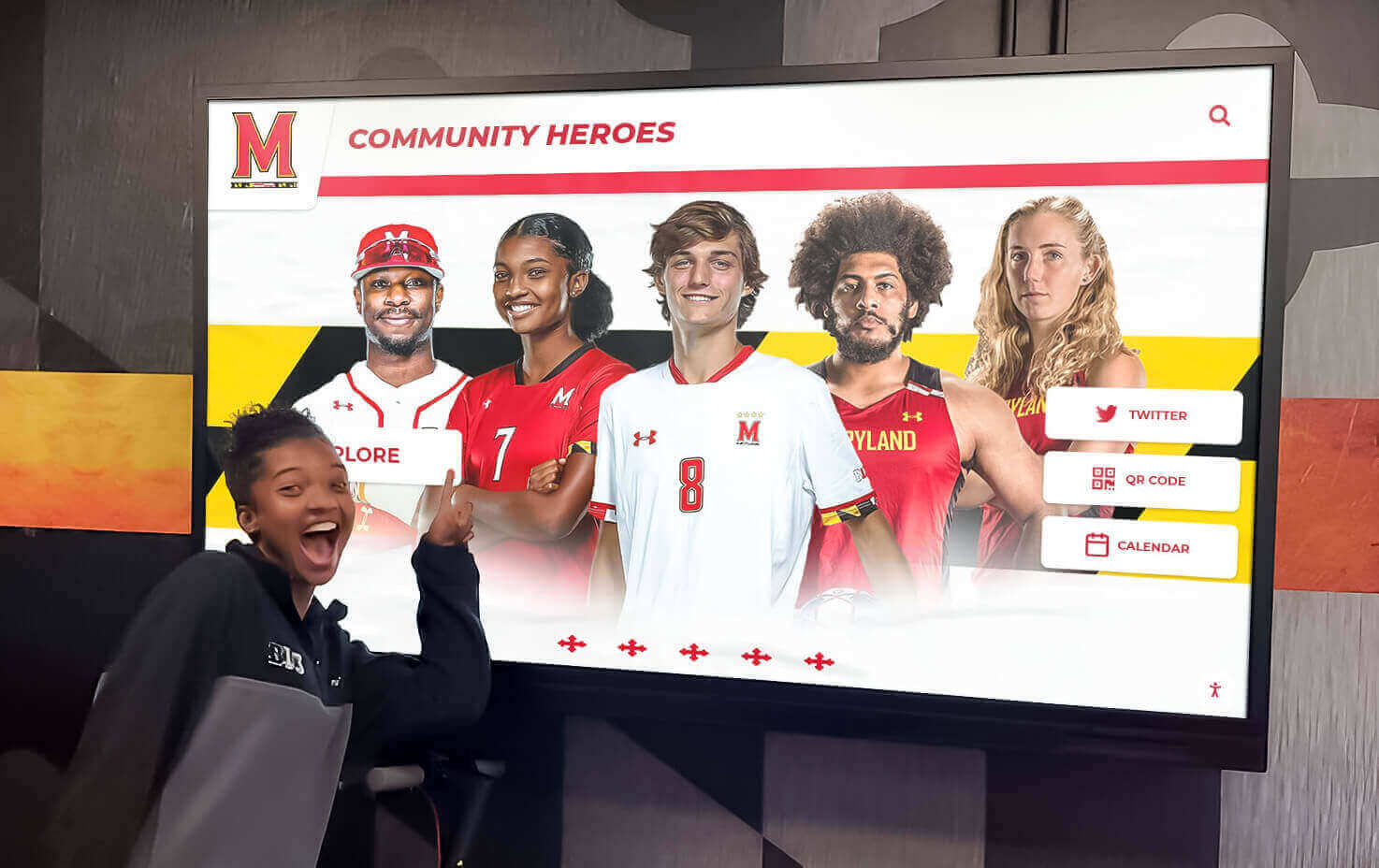
Recognition displays inspire younger athletes while celebrating college commitments and elite achievement pathways
Core Components of Effective ECNL Recognition Systems
Successful ECNL all-star recognition incorporates elements that celebrate both individual excellence and team achievement while inspiring future athletes.
Systematic Achievement Documentation
Comprehensive recognition requires organized tracking of ECNL accomplishments across multiple categories and seasons.
National Selection Game Participation
Organizations should maintain complete records of all athletes selected for ECNL National Selection Games, including:
National Selection Documentation
- Player name, position, and age group at time of selection
- Event location and date (Phoenix, Las Vegas, Texas, North Carolina, South Carolina, Florida events)
- East or West team assignment
- Game statistics and performance highlights
- College scouts and recruiters in attendance
- Subsequent college commitments or professional pathway progression
- Photos from selection game participation
- Coach and scout evaluations or testimonials
This comprehensive documentation enables rich recognition content celebrating the achievement’s significance while providing context for younger athletes aspiring to similar recognition.
Championship Team Records
Clubs winning ECNL national, conference, or regional championships deserve thorough documentation:
Championship Documentation Elements
- Complete team rosters with all players regardless of playing time
- Coaching staff and technical director recognition
- Season record, goals scored, and defensive statistics
- Tournament bracket progression and scores
- Championship game highlights and defining moments
- Individual honors earned by team members (Player of the Year, all-star selections)
- Roster photos and celebration imagery
- Season narratives explaining what made the team exceptional
Many organizations report that comprehensive championship documentation years later becomes invaluable for recruitment, alumni engagement, and organizational history preservation.
Multi-Year Achievement Tracking
Effective recognition systems track athlete progression across multiple seasons, showing development pathways from early ECNL participation through high school completion and college commitment.
Individual Athlete Profiles
Solutions like Rocket Alumni Solutions enable organizations to create comprehensive athlete profiles tracking:
Progressive Recognition Elements
- First year of ECNL participation and initial age group
- Season-by-season statistics and achievement progression
- All-star selections and honors earned across multiple years
- National Selection Game appearances at different age groups
- Championship participation and titles earned
- Leadership roles (captain designations, mentor recognition)
- College recruitment timeline and eventual commitment
- Post-graduation career updates (college performance, professional opportunities)
This multi-year tracking demonstrates development pathways for younger athletes while creating rich alumni profiles maintaining organizational connections long after athletes graduate or move to college programs.
Discover best practices for creating comprehensive athlete halls of fame with approaches applicable to elite youth soccer programs.
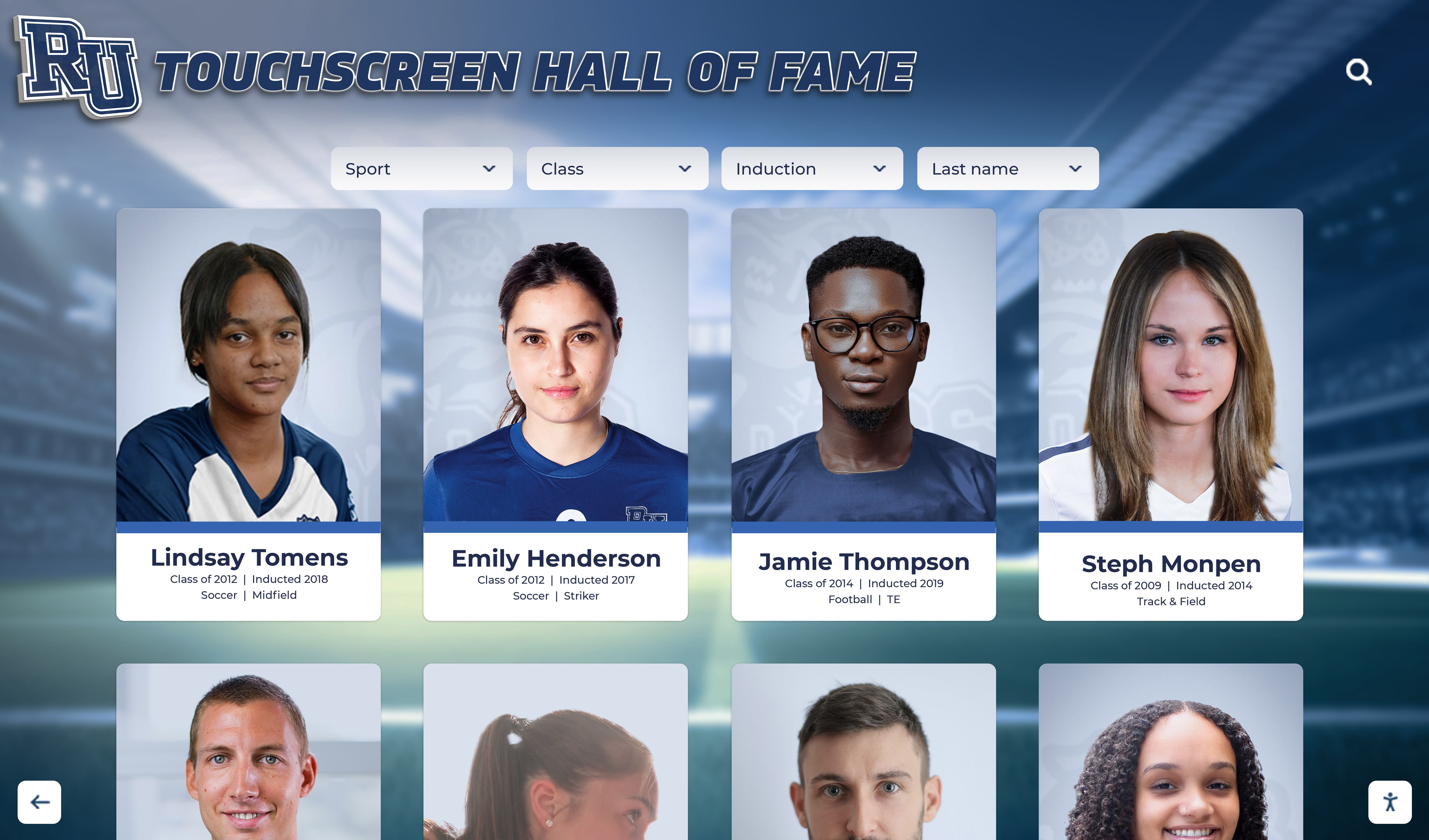
Comprehensive profiles track athlete progression from youth participation through college commitment and beyond
Integrated Team and Individual Recognition
Effective ECNL recognition balances team championship celebration with individual achievement acknowledgment.
Team Championship Displays
Championship team recognition should occupy prominent facility locations with:
Championship Display Elements
- Large format team photos with complete rosters
- Championship trophy and medal imagery
- Season highlight videos from defining games
- Tournament bracket visualizations showing playoff progression
- Individual athlete profile links enabling exploration of team member achievements
- Coach testimonials and season reflections
- Statistical leaders and record-setting performances
- Comparison to organizational championship history
These comprehensive team displays ensure every athlete receives recognition regardless of individual playing time or statistical contribution while celebrating collective achievement.
Individual Achievement Galleries
Beyond team championships, create dedicated spaces recognizing individual honors:
Individual Recognition Categories
- ECNL National Selection Game participants by year and event
- Player of the Year and runner-up recognitions
- All-conference and all-region team selections
- Statistical leaders (leading scorers, assists, shutouts)
- College commitment announcements organized by commitment level and institution
- Multi-year contributors showing sustained excellence
- Record-setting performances and program milestones
This dual approach ensures both team and individual excellence receive appropriate celebration without diminishing either achievement category.
Implementing Interactive Digital Recognition Platforms
Modern touchscreen displays provide practical solutions for comprehensive ECNL recognition that traditional trophy cases and bulletin boards cannot match.
Unlimited Recognition Capacity
Digital systems eliminate fundamental space constraints limiting traditional recognition approaches, enabling organizations to honor all ECNL achievements comprehensively.
Comprehensive Program Coverage
Digital recognition platforms enable clubs and schools to showcase:
Complete ECNL Recognition Scope
- All National Selection Game participants across all age groups and years
- Every championship team with complete rosters and season documentation
- Individual award recipients from all competitive divisions
- College commitments across all collegiate levels
- Multi-season athlete profiles tracking complete ECNL careers
- Historical program achievements dating to initial ECNL membership
- Comparison statistics showing program growth and competitive improvement
This unlimited capacity ensures no achievement goes unrecognized due to physical display limitations, every athlete receives appropriate acknowledgment regardless of roster size, and complete program history remains accessible rather than being selectively edited based on available wall space.
Historical Archive Building
Organizations with long ECNL histories benefit particularly from digital platforms preserving program legacy:
Clubs report that comprehensive historical archives demonstrate program longevity and consistent excellence, preserve memories for families whose children participated years earlier, show prospective families the depth of elite development tradition, and create institutional memory independent of coaching or administration turnover.
This historical preservation proves especially valuable for organizations with decade-plus ECNL membership that would require dozens of traditional displays to document comprehensively.
Learn about building comprehensive recognition archives in finding and preserving athletic records with approaches applicable to elite youth soccer programs.
Multimedia Storytelling Capabilities
Digital recognition enables rich content impossible with physical trophy cases or static wall displays.
Enhanced Content Types
- High-resolution team and individual action photos
- National Selection Game and championship video highlights
- Athlete testimonial videos discussing ECNL experience
- Season recap presentations with game footage
- College commitment announcement videos
- Alumni updates showing post-graduation success
- Interactive statistics and career progression visualizations

- View coach profiles showing complete tenure and achievements
- Explore team pages with complete rosters and season statistics
- Compare athlete statistics across different seasons and age groups
This searchability means families can find their athlete’s recognition immediately, visiting recruits can explore program depth and elite achievement culture quickly, and alumni can reconnect with their competitive experiences years later.
Social Sharing Integration
Digital recognition extends impact beyond physical displays:
Families share athlete recognition on social media providing organic program promotion, alumni connect with former teammates reminiscing about championship seasons, college coaches discover program culture and development success through shared content, and prospective families learn about program excellence through authentic peer-to-peer sharing.
Mobile accessibility ensures recognition reaches beyond facility walls to broader audiences supporting program reputation and recruitment.
Explore interactive recognition approaches in interactive touchscreen displays for schools demonstrating engagement-focused implementation strategies.
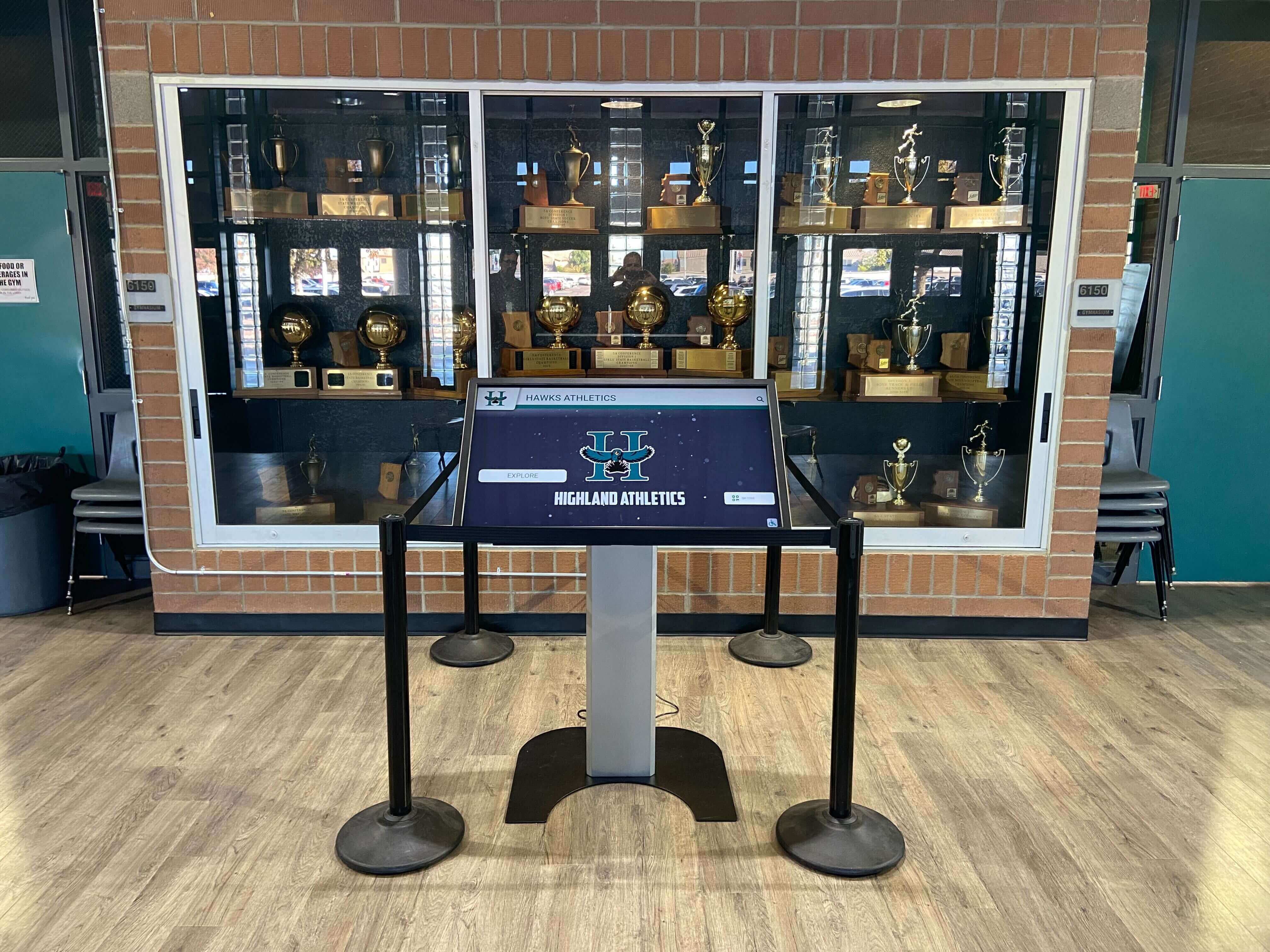
Strategic placement in high-traffic facility areas ensures maximum visibility and engagement with ECNL recognition
Strategic Recognition Implementation for Youth Soccer Organizations
Successfully implementing ECNL recognition requires approaches tailored to club structures, school athletic departments, and youth soccer organizational priorities.
Planning and Stakeholder Engagement
Effective implementation begins with broad input and clear vision alignment across organizational leadership.
Club Leadership Involvement
Secure buy-in and input from:
Key Club Stakeholders
- Club directors providing overall vision and competitive priorities
- ECNL technical directors managing elite programming
- Age-group coaches identifying significant achievements
- Communications staff ensuring integration with broader marketing
- Facility managers addressing installation and placement
- Parent associations providing family perspectives
- Alumni groups connecting with historical achievements
This broad stakeholder engagement ensures recognition systems serve multiple organizational objectives while gaining necessary support for successful implementation.
Athlete and Family Input
Gather perspectives from those recognition will honor:
Participant Feedback Sources
- Current ECNL athletes sharing recognition preferences and priorities
- Recent alumni providing perspective on meaningful acknowledgment
- Parents identifying achievements they value most
- Younger pre-ECNL athletes expressing what inspires them
- College-committed athletes reflecting on developmental journey
This input ensures final systems meet actual needs rather than assumptions about what might resonate with youth athletes and families.
Content Development and Documentation Systems
Comprehensive recognition requires systematic content creation and ongoing documentation workflows.
Current Season Documentation
Establish processes capturing ongoing ECNL activities:
Documentation Workflows
- Professional team photo sessions at start of each season
- National Selection Game documentation including photos, rosters, results
- Championship tournament video recording and photo coverage
- Individual highlight footage compilation throughout seasons
- College commitment announcement standardization
- Statistical tracking and record-keeping systems
- Athlete testimonial video collection at season end
- Exit interviews with graduating seniors documenting complete ECNL experience
These systematic processes ensure nothing falls through cracks and content remains consistently high quality across seasons and age groups.
Historical Archive Development
Many organizations lack organized ECNL historical records requiring dedicated research:
Research Methodologies
- League records and tournament results documentation
- Club archives and historical rosters
- Photo collections from families and team managers
- Social media archives from previous seasons
- News coverage and media reports about achievements
- Alumni outreach identifying undocumented accomplishments
- Facility dedication materials and recognition programs
This historical work preserves program legacy while creating comprehensive content foundations for recognition displays.
Organizations should review best practices for digitizing athletic records and achievements with systematic approaches to historical content development.
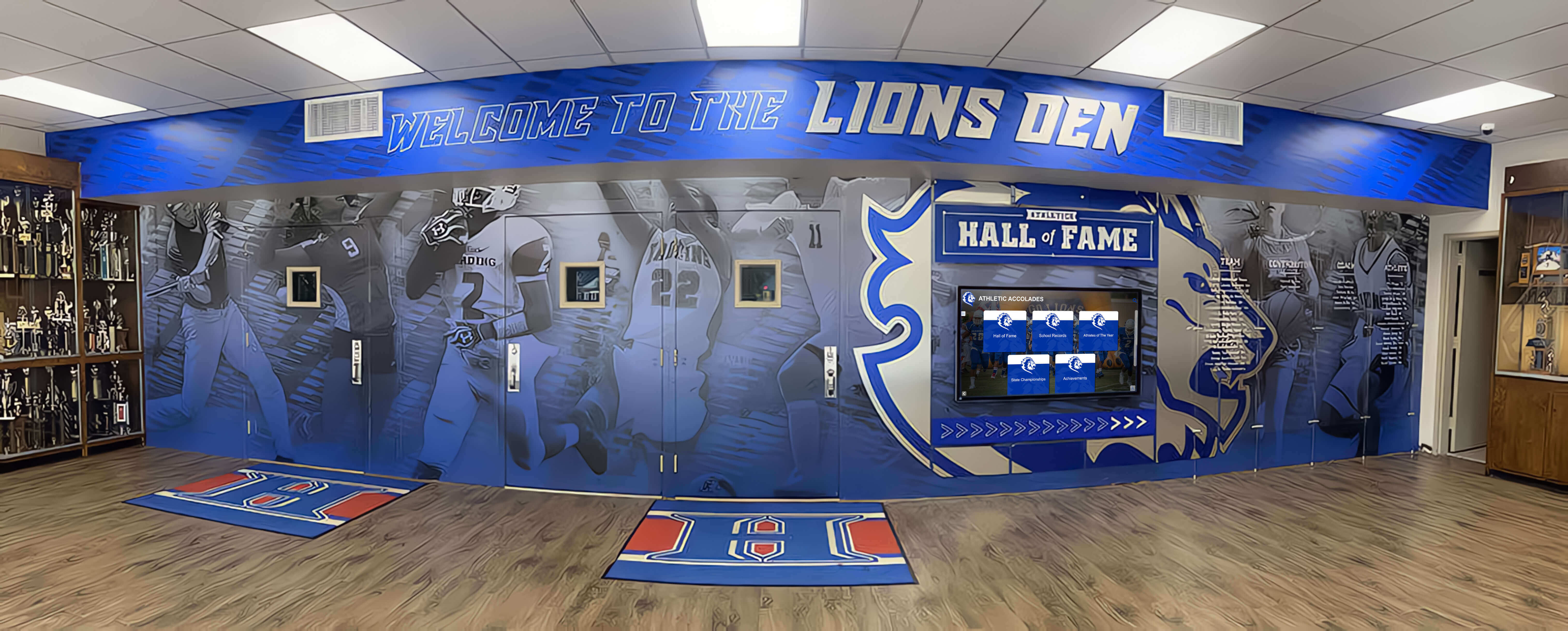
Integrated recognition combines traditional trophy display with modern digital platforms for comprehensive celebration
Technology Selection and Installation
Appropriate technology choices ensure long-term success and maintainability for ECNL recognition systems.
Hardware Considerations for Athletic Facilities
Youth soccer environments present specific technical requirements:
Installation Factors
- Screen size appropriate for viewing distances in lobbies and training facilities
- Durability suitable for high-traffic areas with athletes and equipment
- Weather resistance for outdoor or semi-outdoor field complex installations
- Touchscreen responsiveness compatible with athletic facility environments
- Security features preventing theft or vandalism in public spaces
- Network connectivity supporting cloud-based content management
- Power requirements and installation infrastructure
Commercial-grade displays rated for continuous operation provide reliability essential for always-on installations in athletic facilities with varying supervision levels.
Software Platform Requirements
Purpose-built recognition platforms offer advantages over generic digital signage:
Essential Platform Capabilities
- Intuitive content management requiring no technical expertise
- Cloud-based access enabling remote updates from any device
- Unlimited content storage supporting extensive multimedia
- Sports-specific organization by season, team, and achievement category
- Mobile-responsive web access extending recognition beyond physical displays
- Role-based permissions enabling appropriate access for coaches and administrators
- Automated layout generation maintaining professional appearance
- Social sharing integration supporting family and alumni engagement
Solutions like Rocket Alumni Solutions provide comprehensive platforms specifically designed for athletic recognition needs including youth soccer clubs, high school programs, and college athletic departments.
Strategic Placement Decisions
Display location significantly impacts engagement and recognition effectiveness:
Optimal Soccer Facility Locations
- Main entrance lobbies welcoming all visitors and families
- Training facility common areas where athletes gather
- Locker room corridors creating daily visibility
- Tournament hosting spaces showcasing organizational excellence to visitors
- Parent viewing areas adjacent to training fields
- Athletic director or club office areas for recruit tours
- Multi-purpose rooms hosting team meetings and events
Multiple distributed displays ensure recognition reaches diverse audiences throughout facilities rather than limiting visibility to single locations.
Learn about effective placement strategies in digital trophy case implementation with approaches applicable to youth soccer environments.
Connecting ECNL Recognition to Broader Organizational Goals
ECNL all-star recognition should serve broader development, recruitment, and community-building objectives beyond simple celebration.
Recruitment and Marketing Impact
Comprehensive ECNL recognition provides powerful recruiting tools for attracting elite youth soccer talent.
Demonstrating Elite Development Culture
Prospective families evaluating multiple elite clubs seek evidence of:
Development Environment Indicators
- Track record of producing National Selection Game participants
- Championship success demonstrating competitive excellence
- College commitment results showing pathway effectiveness
- Multi-year athlete development showing sustained improvement
- Alumni success in college and beyond validating long-term development
- Comprehensive recognition demonstrating organizational pride in athlete achievement
Recognition displays provide tangible evidence of these development outcomes during facility tours when families make critical club selection decisions. Organizations report that comprehensive recognition significantly influences family choices when comparing similar competitive programs.
Differentiation in Competitive Markets
In markets with multiple ECNL clubs or high-level alternatives, recognition creates differentiation:
Systematic celebration of all achievements demonstrates organizational thoroughness, professional multimedia recognition suggests program sophistication and resources, historical archive depth shows program longevity and stability, and visible pride in athlete accomplishment indicates culture of celebration and support.
This differentiation proves particularly valuable in competitive youth soccer markets where multiple organizations compete for the same elite athlete population.
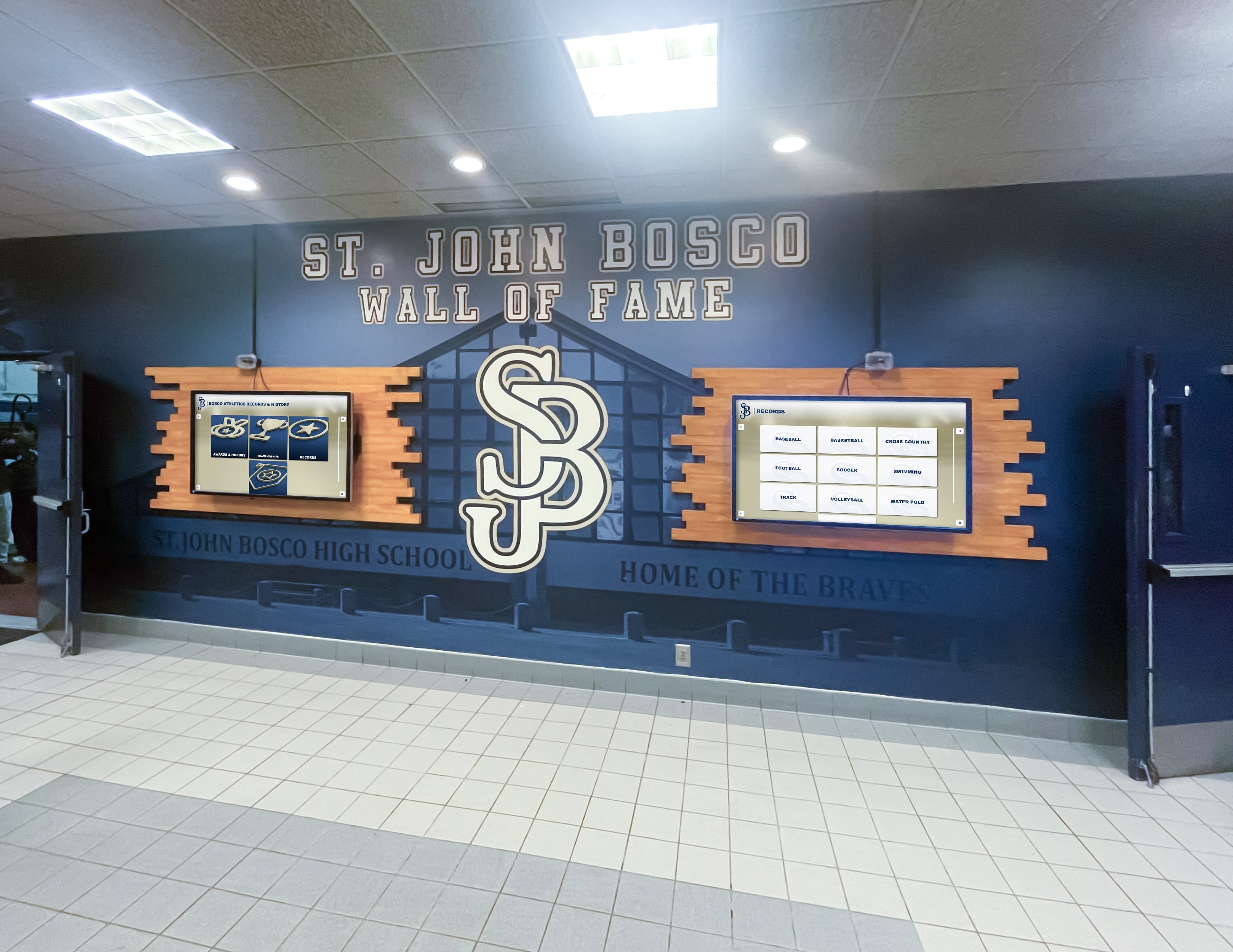
Professional recognition installations demonstrate organizational commitment to celebrating athlete achievement
Athlete Development and Motivation
Recognition serves developmental purposes beyond simple acknowledgment, particularly with youth athlete populations.
Creating Visible Aspirational Pathways
Younger athletes benefit from seeing clear progression pathways:
Pre-ECNL athletes see National Selection Game participants who came through the same club pipeline, understand typical development timelines from early ECNL participation to college commitment, identify role models with similar playing styles or positions, and recognize that elite achievement occurs within their organization creating realistic aspirational goals.
Organizations report that comprehensive recognition of development pathways helps younger athletes envision their own potential progression while maintaining motivation through challenging developmental periods.
Validating Effort and Dedication
Youth soccer requires extraordinary commitment:
ECNL athletes typically train 4-6 days weekly, compete in weekend tournaments requiring extensive travel, miss school and social events for soccer commitments, and manage academic demands alongside elite athletic training.
Permanent, prominent recognition validates these sacrifices by demonstrating that the organization values and remembers these achievements long after the season ends. This validation proves particularly meaningful for youth athletes navigating the pressures of elite competition.
Explore approaches for showcasing student athletic achievement with strategies applicable to elite youth soccer contexts.
Alumni Engagement and Community Building
ECNL recognition creates foundation for long-term alumni relationships extending beyond high school graduation.
Maintaining Alumni Connections
Comprehensive recognition provides touchpoints for alumni engagement:
Alumni Relationship Opportunities
- Annual updates from college and professional athletes
- Alumni showcase games and events at club facilities
- Mentorship programs connecting current athletes with alumni
- Career networking among ECNL alumni community
- Fundraising campaigns leveraging alumni pride and gratitude
- Continued social media engagement sharing updates
- Alumni profiles on digital displays keeping connections visible
Organizations with systematic ECNL alumni engagement report significant benefits including volunteer coaching assistance, financial support and donations, recruitment referrals from alumni, and positive reputation enhancement through alumni advocacy.
Multi-Generational Family Connections
Youth soccer frequently involves multiple family members across time:
Comprehensive recognition enables families to see multiple children’s achievements documented, creates connections between siblings who participated in different years, preserves family legacy within organizational history, and strengthens multi-generational family loyalty to clubs and programs.
These family connections prove particularly valuable for club stability and long-term financial health as families continue involvement across multiple children and even grandchildren.
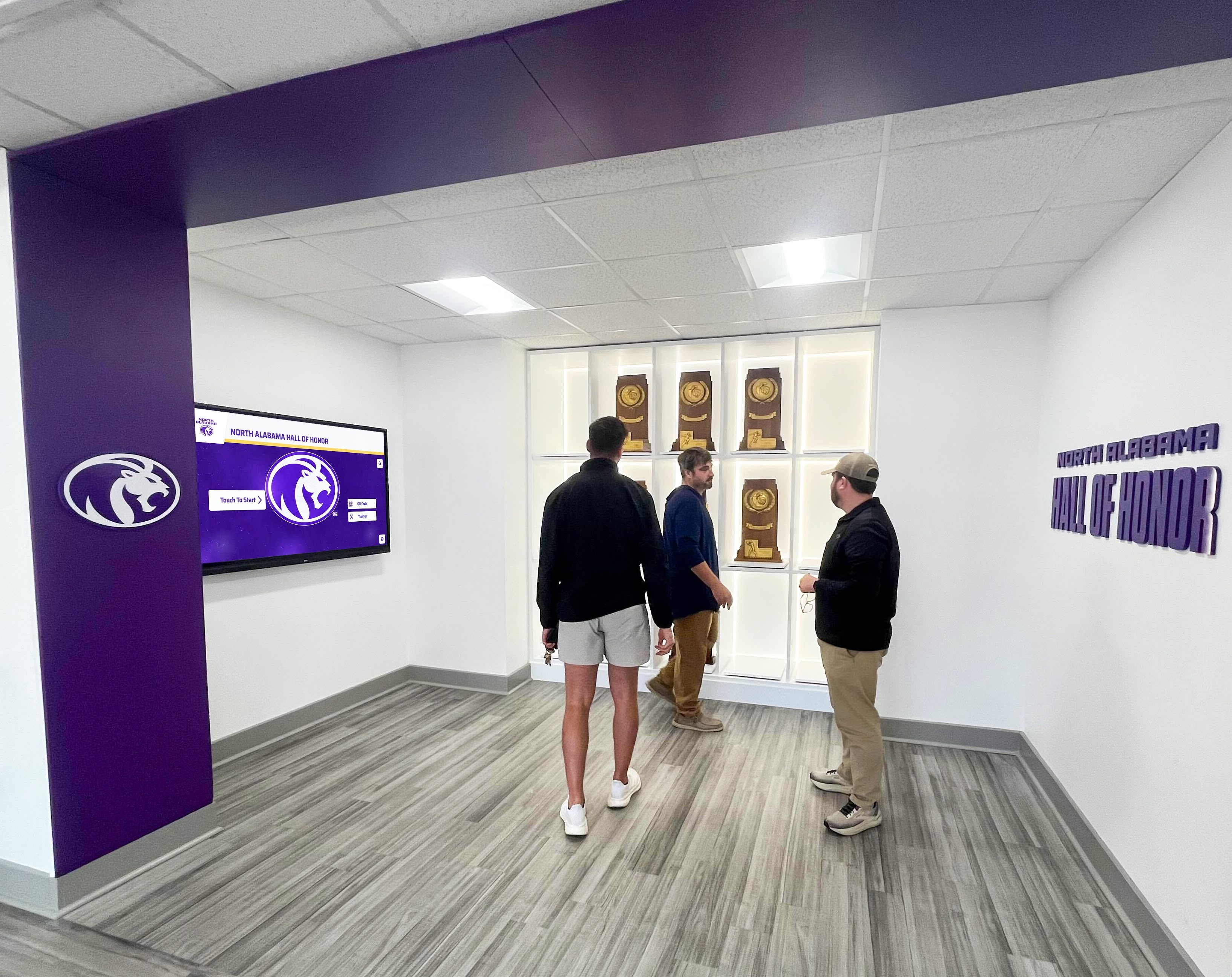
Recognition displays create gathering spaces where families celebrate achievements and build community connections
Budget and Funding Strategies for ECNL Recognition
Organizations implementing comprehensive ECNL recognition need realistic financial planning and creative funding approaches.
Investment Cost Considerations
Understanding typical investment ranges helps organizations plan appropriately:
Recognition System Investment Levels
- Basic single-display systems: $8,000-$15,000 including hardware, software, installation, and initial content development
- Comprehensive multi-display installations: $15,000-$30,000 with larger screens and multiple facility locations
- Premium systems with custom integration: $30,000-$50,000+ for extensive facilities with complex technical requirements
Ongoing costs include annual platform subscription fees (typically $1,200-$3,000), periodic hardware maintenance and eventual replacement, and staff or volunteer time for content management and updates.
Creative Funding Approaches
Organizations successfully fund recognition systems through diverse sources:
Funding Strategies
- Club operating budget allocations demonstrating program priority
- Sponsorship opportunities from local businesses with facility visibility
- Parent association fundraising campaigns specifically for recognition
- Memorial dedications honoring deceased members with soccer connections
- Alumni campaigns leveraging gratitude from former players
- Capital campaign components within broader facility improvement projects
- In-kind contributions of installation or content production services
- Tournament hosting revenue designated for facility enhancements
The tangible, visible nature of recognition displays makes them attractive to donors seeking concrete impact from contributions while providing naming opportunities for major donors.
Return on Investment Considerations
While recognition involves significant investment, organizations report multiple benefits justifying costs:
Quantifiable Organizational Benefits
- Enhanced recruitment success attracting elite athletes
- Improved athlete retention through culture of recognition
- Increased family satisfaction and program advocacy
- Alumni engagement supporting long-term giving and volunteerism
- Facility differentiation in competitive markets
- Reduced staff time updating traditional bulletin boards
- Extended marketing reach through social media sharing
- Professional image enhancement with recruits and partners
Many organizations discover recognition investments support multiple objectives simultaneously while providing decades of ongoing value through continual content additions and updates.
Phased Implementation Approaches
Limited budgets need not prevent recognition implementation:
Phased Strategies
- Start with single high-traffic location expanding later
- Launch with recent content adding historical archives over time
- Begin with priority age groups (graduating seniors, recent champions) expanding systematically
- Use volunteer parent labor for content creation reducing initial costs
- Implement basic systems with future feature additions planned
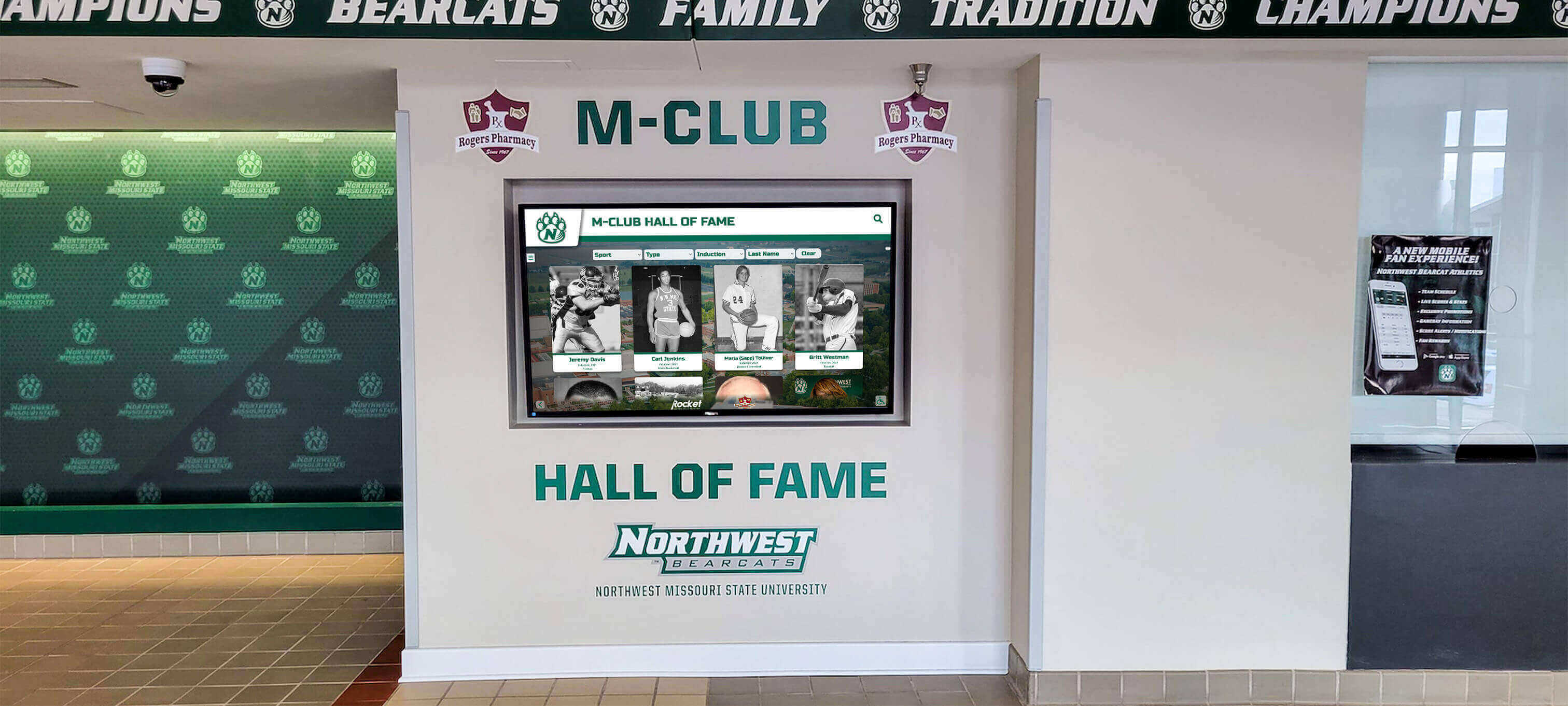
Professional installations demonstrate organizational commitment while remaining scalable to budget capacity
Phased approaches make recognition accessible while allowing organizations to demonstrate value before expanding investments. Many clubs report that successful initial installations create demand for expansion as stakeholders experience benefits firsthand.
Measuring ECNL Recognition Impact
Assessment demonstrates whether recognition systems achieve intended outcomes while identifying improvement opportunities.
Quantitative Engagement Metrics
Digital platforms provide concrete usage data revealing recognition effectiveness:
Measurable Indicators
- Display interaction frequency and session duration
- Most-viewed content revealing athlete and family interests
- Search patterns showing how users navigate recognition
- Peak usage times informing content update scheduling
- Social media sharing frequency indicating organic promotion
- Web platform visits from remote users and recruits
- Content addition patterns tracking documentation consistency
These metrics reveal whether recognition generates intended engagement or requires strategy adjustments to improve visibility and accessibility.
Qualitative Impact Assessment
Beyond numbers, observe cultural and relational impacts:
Qualitative Indicators
- Athlete and family satisfaction with recognition approaches
- Recruit feedback during facility tours and decision processes
- Alumni engagement frequency and relationship strength
- Volunteer interest in supporting content development
- Community perception of program quality and culture
- Staff and coach pride in recognition quality
- Parent advocacy and word-of-mouth referrals
Regular feedback collection enables continuous improvement ensuring recognition remains effective and aligned with organizational objectives.
Organizational Outcome Documentation
Connect recognition to broader results:
Organizational Impact Measures
- Recruitment success rates and athlete retention
- Fundraising and sponsorship revenue growth
- Alumni giving and volunteer participation
- Family satisfaction scores and net promoter ratings
- Facility tour conversion rates for prospective families
- Social media engagement and follower growth
- Tournament hosting reputation and repeat bookings
Positive trends suggest recognition contributes to organizational success beyond simple athlete appreciation, providing justification for continued investment and expansion.
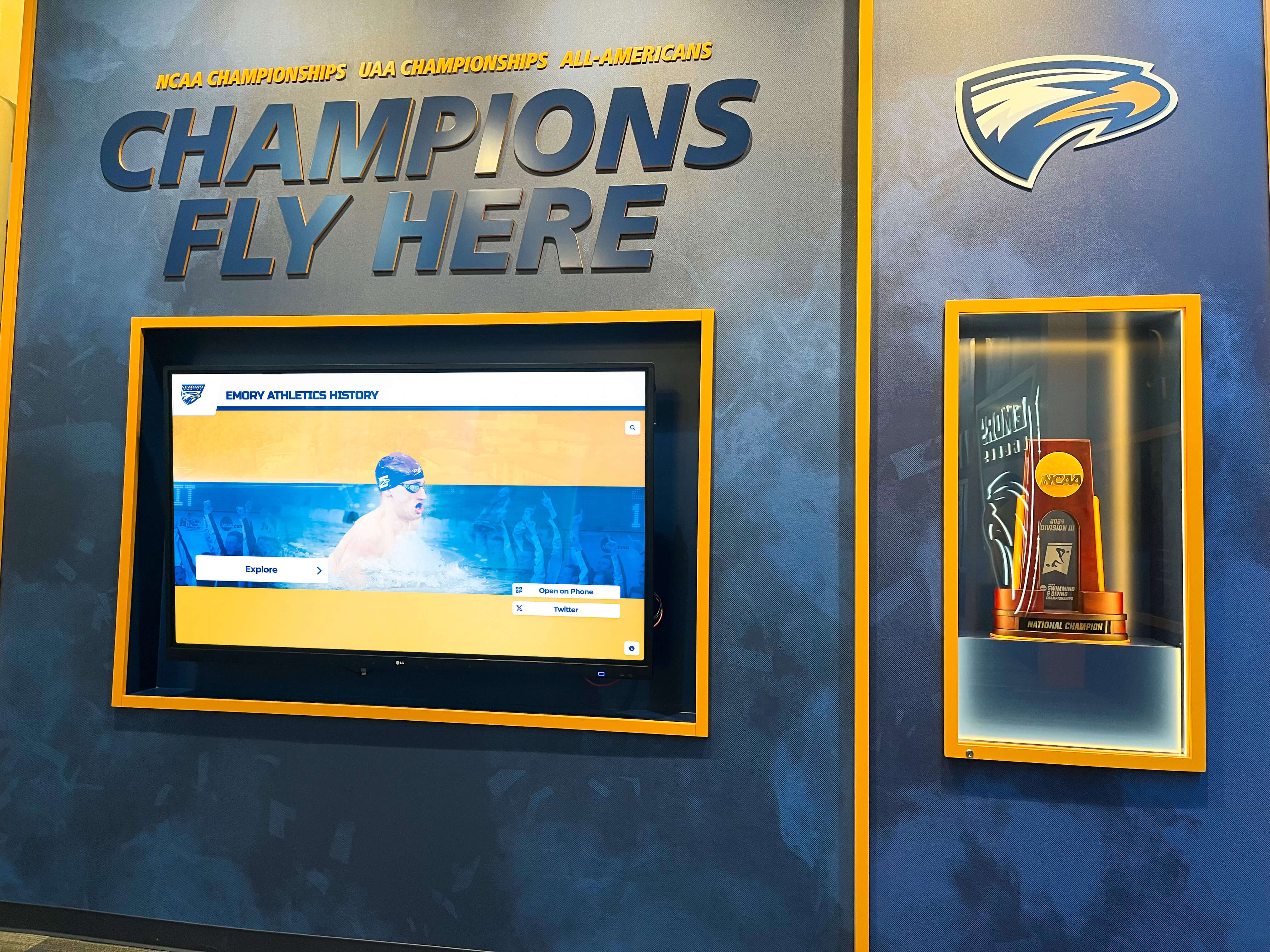
Comprehensive recognition systems honor competitive excellence while building organizational pride and culture
Special Considerations for Elite Youth Soccer Recognition
ECNL recognition requires sensitivity to youth sports contexts and elite competitive environments.
Balancing Individual and Team Recognition
Elite youth sports navigate tension between celebrating individual excellence and maintaining team cohesion.
Individual Achievement Recognition Without Division
Organizations should recognize that National Selection Games honor individual excellence separate from team success, all-conference selections acknowledge personal performance within team contexts, and statistical leaders demonstrate individual skill supporting team objectives.
Recognition should celebrate these individual achievements prominently while maintaining emphasis on team contribution, collective success, and program culture that enables individual development.
Inclusive Team Recognition Approaches
Championship team displays should ensure every roster member receives equal prominence regardless of playing time, coaches and support staff receive appropriate acknowledgment alongside players, and team chemistry and culture receive emphasis equal to competitive results.
This balanced approach ensures competitive excellence receives celebration while maintaining youth sport priorities around character development, team concepts, and inclusive participation.
Age-Appropriate Recognition Strategies
Youth athletes have different developmental needs than adult athletes or professional competitors.
Recognition That Motivates Without Pressure
Effective youth recognition celebrates achievement while avoiding excessive pressure by emphasizing development and improvement over absolute outcomes, maintaining perspective that youth soccer serves broader developmental purposes, and creating recognition that inspires without creating unhealthy comparison or anxiety.
Organizations report that recognition focusing on personal growth, team contribution, and effort alongside competitive results creates healthier motivation than pure outcome-based celebration.
Managing Multi-Year Athlete Progression
ECNL athletes typically participate across multiple age groups and seasons creating unique recognition considerations.
Progressive Recognition Building Over Time
Digital platforms enable recognition that grows with athletes:
Initial achievements like first ECNL team participation receive acknowledgment, progression through age groups shows development trajectory, accumulated honors demonstrate sustained excellence over multiple seasons, and eventual college commitment represents culmination of multi-year development journey.
This progressive approach creates narrative arcs showing complete athletic development rather than isolated seasonal snapshots, proving particularly meaningful for athletes, families, and organizational culture building.
Conclusion: Building Lasting Recognition for Elite Youth Soccer Excellence
ECNL all-star recognition represents far more than simple athlete acknowledgment—it creates systematic frameworks honoring elite achievement, inspiring future generations, validating years of dedicated training, strengthening organizational culture around excellence, and demonstrating development pathway effectiveness to prospective families. When organizations systematically celebrate National Selection Game participants, championship teams, individual honors, and college commitments through permanent, engaging recognition platforms, they reinforce that elite achievement matters while creating visible aspirational pathways for younger athletes beginning their competitive journeys.
The strategies explored in this guide provide comprehensive approaches for implementing recognition that celebrates individual excellence appropriately, honors team achievement comprehensively, preserves program legacy across generations, inspires younger athletes through visible role models, and serves broader organizational goals including recruitment, alumni engagement, and community building. From interactive digital displays eliminating space constraints to systematic documentation preserving complete athlete development narratives, these approaches overcome traditional limitations while creating engaging recognition experiences impossible with bulletin boards and trophy cases alone.
Transform Your ECNL Recognition Program
Discover how modern interactive display solutions can help you celebrate every National Selection Game participant, honor all championship teams, and inspire the next generation of elite soccer athletes through comprehensive digital recognition.
Explore Recognition SolutionsDigital recognition platforms like Rocket Alumni Solutions provide purpose-built systems specifically designed for athletic recognition including youth soccer clubs, high school programs, and athletic organizations. These platforms combine unlimited recognition capacity with intuitive content management, multimedia storytelling capabilities, and engaging interactive experiences that honor athletes while serving organizational objectives effectively.
Start wherever current situations permit—whether implementing comprehensive recognition systems or beginning with priority age groups while planning expansion—then systematically build displays your ECNL program deserves. Every athlete who receives meaningful recognition for National Selection Game participation develops stronger organizational connections while feeling valued for elite achievement. Every championship team comprehensively documented creates lasting legacy inspiring future athletes. Every college commitment celebrated demonstrates development pathway effectiveness to prospective families evaluating your program.
Your ECNL program represents extraordinary athlete commitment, substantial organizational investment, and exceptional competitive achievement that deserves recognition systems celebrating these accomplishments appropriately. With thoughtful planning, appropriate technology selection, and systematic implementation, you can create recognition that preserves program history, honors all participants, inspires future athletes, and strengthens organizational culture around elite youth soccer development.
Ready to begin? Explore how Rocket Alumni Solutions can help you create comprehensive ECNL all-star recognition that celebrates elite achievement while supporting the athlete development, recruitment excellence, and organizational culture essential to premier youth soccer programs competing at the highest levels of American youth athletics.




































